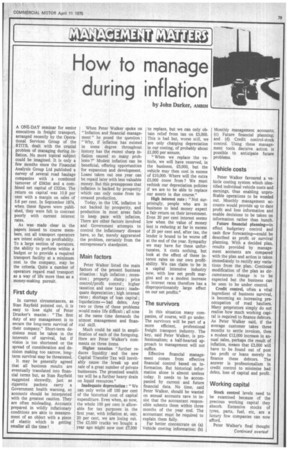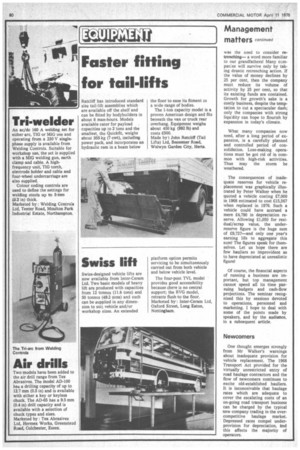How to manage during inflation
Page 81

Page 82

If you've noticed an error in this article please click here to report it so we can fix it.
by John Darker, AIIII31111
A ONE-DAY seminar for senior executives in freight transport, arranged recently by the Operational Services Group of the RTITB, dealt with the crucial problem of managing during inflation. No more topical subject could be imagined, It is only a few months since the Financial Analysis Group Ltd published a survey of several road haulage companies with a combined turnover of £583m and a combined net capital of £332m. The return on capital was 10.9 per cent with a margin on sales of 5.6 per cent. In September 1974, when these figures were published, they were felt to contrast poorly with current interest rates.
As was made clear in the papers issued to course members, not all transport operators are intent solely on profitability. To a large section of operators, the ability to perform within a budget or to provide a required transport facility at a minimum cost to the company, may be the criteria. Quite a number of operators regard road transport as a way of life more than as a money-making pursuit.
First duty
In current circumstances, as Stan Rayfield pointed out, it is easy to lose sight of Peter Drucker's maxim : "The first duty of any management is to secure the long-term survival of their company." Short-term decisions must be taken in the interests of survival, but if vision is too shortened or the spread of consideration and decision making too narrow, longterm survival may be threatened, It may be generally agreed that all business results are eventually translated into financial terms but, as Stan Rayfield suggested shrewdly, just as cigarette packets carry a Government health warning, so accounts should be interpreted with the greatest caution. They are often misleading. Accounts prepared in wildly inflationary conditions are akin to measurement of an object with a piece of elastic which is getting smaller all the time When Peter Walker spoke on 'Inflation and financial management" he posed the question : "Why, if inflation has existed in some degree throughout history has the recent sharp inflation caused so many problems ?" Modest inflation can be beneficial, offering opportunities for expansion and development. Loans taken out one year can be repaid later with less valuable money. But this presupposes that inflation is backed by prosperity which can only come from increased production.
Today, in the UK, inflation is not backed by prosperity, and production in most areas fails to keep pace with inflation. There are other factors involved and Government attempts to control the inflationary disease have, so far, merely aggravated the problem, certainly from the entrepreneur's standpoint,
Main factors
Peter Walker listed the main factors of the present business situation : high inflation ; recession; property slump ; price control/profit control ; higher taxation and new taxes ; inadequate depreciation ; high interest rates ; shortage of loan capital ; liquidations — bad debts. Any two or three of these problems would make life difficult ; all nine at the same time demands the utmost management and financial skill.
Much could be said in amplification of each of the foregoing. Here are Peter Walker's comments on three items.
Higher taxation "further reduces liquidity and the new Capital Transfer Tax will inevitably cause the break up and sale of a great number of private businesses. The promised wealth tax will be a further heavy drain on liquid resources."
Inadequate depreciation : "We can only write off 100 per cent of the historical cost of capital expenditure. Even when, as now, the whole 100 per cent is allowable for tax purposes in the first year, with inflation at, say, 20 per cent, we are losing out. The £5,000 trucks we bought a year ago might now cost £7,000 to replace, but we can only obtain relief from tax on £5,000. This is had but, worse still, we are only charging depreciation in our costing, of probably about £1,000 per annum.
"When we replace the vehicle, we will have reserved, in the business, £5,000, but the vehicle may then cost in excess of £10,000. Where will the extra £5,000 come from ? We must rethink our depreciation policies if we are to be able to replace our assets in due course."
High interest rate : "Not surprisingly, people who are in business to lend money expect a fair return on their investment. Even 20 per cent interest seems low when the value of money lent is reducing at far in excess of 20 per cent and, after tax, the lender is bound to be worse off at the end of the year. Sympathy we may have for these unfortunates, it costs nothing, but look at the effect of these interest rates on our own profitability. We can claim to be in a capital intensive industry now, with low net profit margins and so a modest increase in interest rates therefore has a disproportionately large effect on our net profits."
The survivors
In this situation many companies, of course, will go under. The survivors will be part of a more efficient, professional freight transport industry. The key, said Peter Walker, is professionalism; a half-hearted approach to management will not suffice.
Effective financial management comes from effective financial control based on information. But historical information alone is almost useless today. It needs to be accompanied by current and future financial data. No time, said Peter Walker, should be wasted on annual accounts save to insist that the accountant responsible submits them within three months of the year end. The accountant must be required to explain them fully.
Far better concentrate on (a) Vehicle costing information; (b) Monthly management accounts; (c) Future financial planning; and (d) Credit control-stock control. Using these management tools decisive action is possible to anticipate future problems.
Vehicle costs
Peter Walker favoured a vehicle costing system which identified individual vehicle costs and earnings, thus enabling unprofitable operations to be weeded out. Monthly management accounts would provide up to date profit and loss information and enable decisions to be taken on information rather than hunch.
Future financial planning—in effect budgetary control and cash flow forecasting—could be described as profit or survival planning. With a decided plan, results provided by management accounts are compared with the plan and action is taken immediately to rectify any variations from the plan. Continual modification of the plan as circumstances change is to be expected but the business can be seen to be under control.
Credit control, often a vital ingredient of business survival, is becoming an increasing preoccupation of road hauliers. Many proprietors simply do not realise how much working capital is required to finance debtors. As Peter Walker said, if the average customer takes three months to settle invoices, then a modest £12,000 increase in annual sales, perhaps the result of inflation, means that £3,000 will have to be found out of post tax profit or loans merely to finance these debtors. The answer is professionalism in credit control to minimise bad debts, loss of capital and profit.
Working capital
Stock control levels need to be examined because of the precious working capital they absorb. Excessive stocks of tyres, parts, fuel, etc, are a luxury few companies can now afford.
Peter Walker's final thought Continued overleaf was the need to consider retrenching— a word more familiar to our grandfathers! Many cornpanles will survive only by taking drastic retrenching action. If the value of money declines by 25 per cent, then the company must reduce its volume of activity by 25 per cent, so that its existing funds are contained. Growth for growth's sake is a costly business, despite the temptation to cut a spectacular dash; only the companies with strong liquIdity can hope to flourish by expansion in today's climate.
What many companies now need, after a long period of expansion, is a carefully planned and controlled period of consolidation. Loss-making operations must be got rid of in common with high-risk activities. Thus may the storm be weathered.
The consequences of inadequate reserves for vehicle replacement was graphically illustrated by Peter Walker when he quoted a vehicle costing £7,000 in 1968 estimated to cost £15,567 when replaced in 1976. Such a vehicle could have accrued a mere £4,790 in depreciation reserve. Allowing £1,050 for residual/scrap value, the underreserve figure is the huge sum of £9,727—and only one year's earning life to aggregate this sum! The figures speak for themselves. Let us hope there are few hauliers so improvident as to have depreciated at unrealistic figure!
Of course, the financial aspects of running a business are important, but top management cannot spend all its time pursuing budgets and cash-flow projections. The seminar recognised this by sessions devoted to operations, personnel and marketing. I hope to deal with some of the points made by speakers, and by the audience, in a subsequent article, Newcomers
One thought emerges strongly from Mr Walker's warnings about inadequate provision for vehicle replacement. The 1968 Transport Act provided for the virtually unrestricted entry of road haulage contractors and the flow of newcomers continues to excite old-established hauliers. It is inconceivable that haulage rates which are adequate to cover the escalating costs of an on-going road transport business can be charged by the typical new company trading in the overcompetitive haulage market. Depressed rates compel underprovision for depreciation, kncl this affects the majority of operators.




































































































































